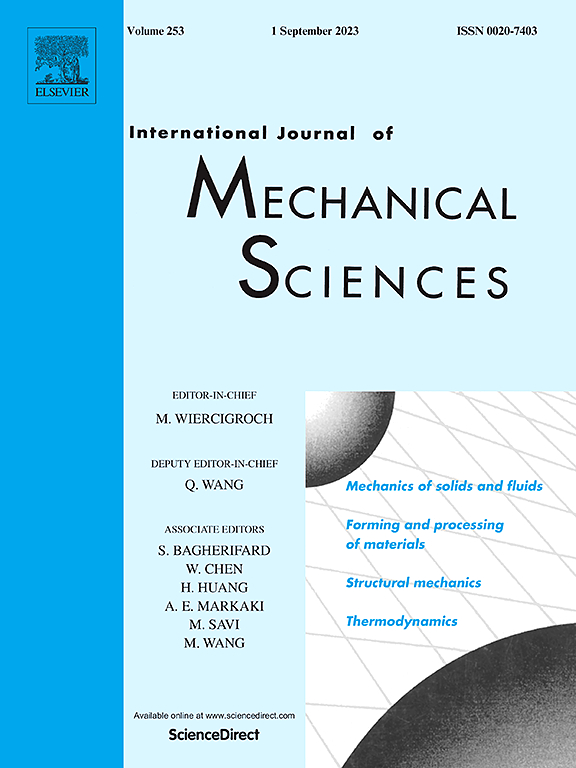A Mechanical Metamaterial for Energy Absorption using Carbon Fiber Composite
IF 7.1
1区 工程技术
Q1 ENGINEERING, MECHANICAL
International Journal of Mechanical Sciences
Pub Date : 2025-04-16
DOI:10.1016/j.ijmecsci.2025.110282
引用次数: 0
Abstract
Mechanical metamaterials are usually prepared using additive manufacturing process, which limits the dynamic tuning of their mechanical properties after preparation. In this study, a mechanical metamaterial was designed using carbon fiber composites, and prepared by hot-pressing process as well as assembled by discrete assembly method. By leveraging the inherent anisotropic properties of the material, a single structure achieved both multi-stable and mono-stable characteristics. A torsion inhibition method based on modular design was employed to inhibit the overall torsion angle of the structure and improve the stability of structures under compression. The mechanical properties of structure under compression and impact were simulated using the finite element method. The simulation results are in good agreement with the experiment data, indicating that the torsion inhibition method effectively reduced the torsion angle. The effects of drilling spacing l, ply angle α, and helix radius r on the mechanical properties were also been studied. Under the multi-stable characteristic of the structure, energy absorption was achieved by overcoming its energy barriers, demonstrating great potential in cushioning and energy absorption applications.
利用碳纤维复合材料制备能量吸收机械超材料
机械超材料的制备通常采用增材制造工艺,这限制了其制备后力学性能的动态调谐。本研究以碳纤维复合材料为材料,设计了一种机械超材料,采用热压法制备,并采用离散装配法进行装配。通过利用材料固有的各向异性,单一结构实现了多稳定和单稳定的特性。采用基于模块化设计的扭转抑制方法抑制结构整体扭转角,提高结构受压稳定性。采用有限元法模拟了结构在压缩和冲击作用下的力学性能。仿真结果与实验数据吻合较好,表明扭转抑制方法有效地减小了扭转角。研究了钻距l、厚度角α和螺旋半径r对合金力学性能的影响。在结构的多稳定特性下,通过克服其能量障碍实现能量吸收,在缓冲和能量吸收方面具有很大的应用潜力。
本文章由计算机程序翻译,如有差异,请以英文原文为准。
求助全文
约1分钟内获得全文
求助全文
来源期刊

International Journal of Mechanical Sciences
工程技术-工程:机械
CiteScore
12.80
自引率
17.80%
发文量
769
审稿时长
19 days
期刊介绍:
The International Journal of Mechanical Sciences (IJMS) serves as a global platform for the publication and dissemination of original research that contributes to a deeper scientific understanding of the fundamental disciplines within mechanical, civil, and material engineering.
The primary focus of IJMS is to showcase innovative and ground-breaking work that utilizes analytical and computational modeling techniques, such as Finite Element Method (FEM), Boundary Element Method (BEM), and mesh-free methods, among others. These modeling methods are applied to diverse fields including rigid-body mechanics (e.g., dynamics, vibration, stability), structural mechanics, metal forming, advanced materials (e.g., metals, composites, cellular, smart) behavior and applications, impact mechanics, strain localization, and other nonlinear effects (e.g., large deflections, plasticity, fracture).
Additionally, IJMS covers the realms of fluid mechanics (both external and internal flows), tribology, thermodynamics, and materials processing. These subjects collectively form the core of the journal's content.
In summary, IJMS provides a prestigious platform for researchers to present their original contributions, shedding light on analytical and computational modeling methods in various areas of mechanical engineering, as well as exploring the behavior and application of advanced materials, fluid mechanics, thermodynamics, and materials processing.
 求助内容:
求助内容: 应助结果提醒方式:
应助结果提醒方式:


